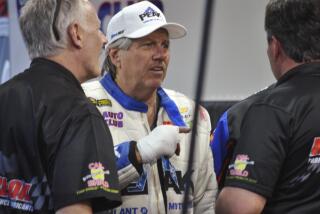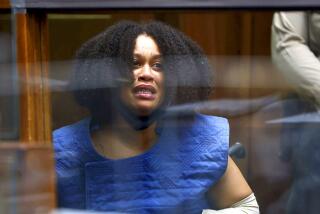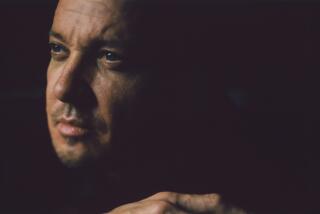Wildlife Agent on Path to Recovery
- Share via
Bruce Toloski has spent his life protecting endangered creatures, but his good deed helping the driver of an overturned Jeep on the Long Beach Freeway proved devastating.
The federal wildlife agent lost half his skull on the night of April 11, when an accused drunk driver nicked the vehicle, flinging its fender into Toloski’s brain. He was comatose for weeks and only began feeding himself three weeks ago. He has had to relearn walking and talking and even swallowing.
But Wednesday, Toloski shuffled out of Long Beach Memorial Medical Center, a slight smile on his face as applauding nurses and orderlies gathered to see him off.
He usually leans on a cane, but for his farewell, he used a cart filled with gift baskets and homemade “Get Well” cards for a walker as he headed toward a parking garage, media cameras flashing behind him and his wife, Lisa. A plastic helmet protected the tender concave spot where the left side of his head was lost.
“He is a hero to me,” said his doctor, H. Richard Adams, a brain recovery specialist. “At a time when fewer people help each other, he didn’t think twice about it.”
That Toloski, 36, risked his life to save another had not surprised his colleagues at the U.S. Fish and Wildlife Service, where there was a cheerful buzz Wednesday about his televised hospital release.
“Everyone is joyful, even with the realization that Bruce still has a lot of work to do,” said Larry Farrington, Toloski’s supervisor. “But it’s miraculous. And that is a word I’ve come to understand should not be used lightly.”
Toloski was rushed that spring night to St. Francis Medical Center’s trauma center, where he remained until he emerged from a coma.
He said Wednesday that he had no memory of the crash, and only slowly did the severity of his ordeal seep in.
“That I lost the left half of my head,” he said slowly, patting dark brown hair covering the indentation toward the front of his skull, “I would learn a little at a time, learn a little more as time went on. It was surprising the amount of damage.”
The hardest part of his comeback was not, he said, vanity nor being dependent on others. “I missed the time [lost] with my wife, and I kind of missed my job,” Toloski said.
The driver of the car that struck the overturned car has been arrested and accused of driving under the influence at the time of the crash; if convicted it would be his third such offense, Toloski’s doctor said.
The driver Toloski rescued before he was injured has never contacted him since the crash on the freeway in Lynwood.
News of Toloski’s progress has also delighted the rank-and-file at the International Bird Rescue and Research Center, the world’s largest such organization and one that frequently works cooperatively with the state and federal wildlife agents.
The Northern California-based research group has a large San Pedro facility, whose staff had worked closely with Toloski as he investigated the maiming earlier this year of at least a dozen endangered California brown pelicans, found in the South Bay, most with wings broken. No suspect has been identified but an investigation continues.
“Bruce Toloski is important to us, to wildlife and the environment,” said Jay Holcomb, the group’s director.
Exactly when he will return to work and at what job will depend on his progress in several areas of rehabilitation, his doctor said. Toloski will visit a home the hospital owns that provides a realistic setting for doing physical therapy and working on everyday skills that are taken for granted until they are lost.
He is fortunate that his wife is specially trained in helping him, and that he is not the only Toloski with tenacity. During his three months in recovery, between daily vigils at the hospital, Lisa finished her college degree -- in rehabilitation therapy.
“I was being prepared for this,” she said, shaking her head.
His doctor said three things contribute to his extraordinary comeback: He was blessed with a brain that, unlike others, withstood impacted skull fragments and was “able to rewire itself, when not all people’s brains can.”
He has essential support from his wife, family, friends and co-workers, who visited him regularly at the hospital.
And then there’s the thing Adams called the wild card, the thing that can mean the difference between surviving but not thriving and bouncing back: “His personality. It is his constitution, if you will, his motivation to try hard, to want to get back to life.”
Having recovered even this far “is something most people won’t do with this kind of injury. He lost half of his skull,” Adams said.
In weeks to come, Toloski said, he will undergo at least one and probably several more surgeries to restore the shape of his head.
“I hope to get back to work in September,” he said, a bit more slowly than he spoke before the crash, but with the same steady voice and eye contact that are his trademark.
Although his doctors called that goal overly ambitious, they don’t doubt he will continue progressing.
“Whenever Bruce is ready to come back, we will welcome him with open arms,” Farrington said. “It’s truly an amazing story. It gives you pause to think about what life is, how precious it is. And to see Bruce make this miraculous recovery gives us all hope.”
More to Read
Sign up for Essential California
The most important California stories and recommendations in your inbox every morning.
You may occasionally receive promotional content from the Los Angeles Times.










